When the pain isn't of dental origin: what is the importance for the endodontist?
Editorial
Autores: Leonardo Rigoldi Bonjardim, Beatriz Amaral de Lim Netto, Rafaela Stocker Salbego, Matheus Herreira-Ferreira,
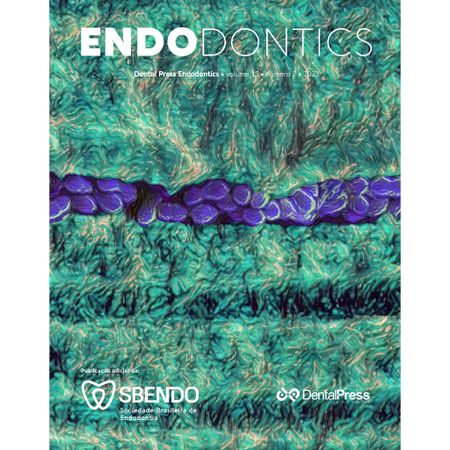
No dia a dia do consultório, as queixas de dor correspondem às principais razões pelas quais os pacientes buscam atendimento. Quadros dolorosos de origem dentária que podem impactar a qualidade de vida — como pulpites reversíveis ou irreversíveis, pericoronarites, fraturas dentárias, cáries profundas, abscessos odontogênicos e hipersensibilidade dentinária — são exemplos mais comuns e, em sua maioria, não costumam apresentar uma grande dificuldade em seu diagnóstico, sendo...
Leia mais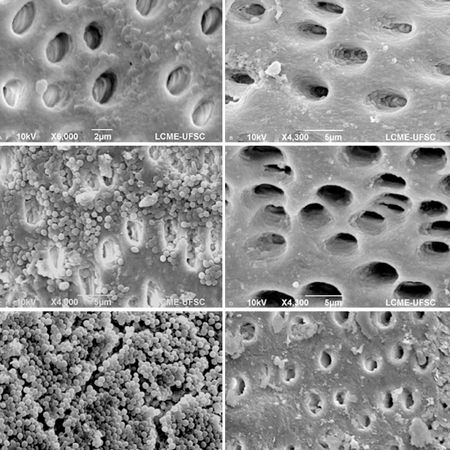
Objetivos: Avaliar e comparar, ex-vivo, o efeito antimicrobiano imediato e residual de diferentes medicações intracanal contra o biofilme de E. faecalis estabelecido no canal radicular de dentes bovinos. Material e Métodos: Após a formação do biofilme de sete dias em 84 tubos de dentina, os espécimes foram divididos em grupos, de acordo com o tipo de medicação intracanal (n=14): G1) hidróxido de cálcio (HC) + propilenoglicol (HC/PG); G2) pasta Calen PMCC®; G3) óleo essencial...
Leia mais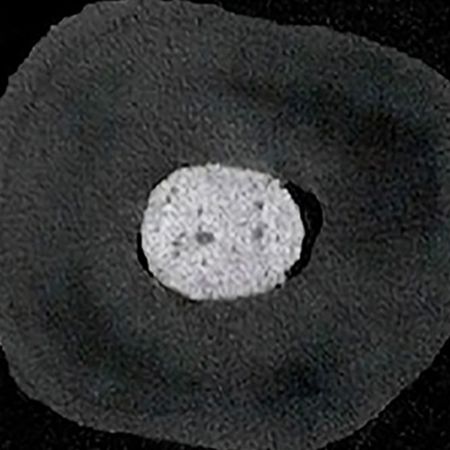
Objetivo: O objetivo do presente estudo foi analisar, por meio de microtomografia computadorizada, a adaptação marginal e a porosidade dos cimentos MTA (Agregado de Trióxido Mineral) e MTA Flow na presença de sangue. Material e Métodos: As raízes de 48 incisivos bovinos medindo 10 mm foram limpas e preenchidas com dois cimentos: MTA e MTA Flow. Após o preenchimento da porção apical, as amostras foram separadas em dois subgrupos, de acordo com o meio de armazenamento (sangue/soro), e...
Leia mais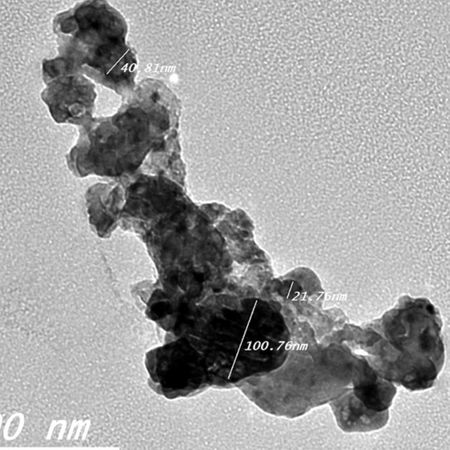
Objetivos: Este estudo investigou e comparou a solubilidade e a resistência da união ao microcisalhamento do cimento ProRoot MTA (PMTA) e do cimento Portland (CP) disponíveis comercialmente com nanoformulações de cimento ProRoot MTA (NPMTA) e de cimento Portland (NCP), na tentativa de desenvolver um novo material para obturação de canais radiculares. Métodos: O teste de solubilidade foi realizado em 48 espécimes com anéis de PVC preenchidos com os cimentos testados: PMTA, CP, NPMTA...
Leia mais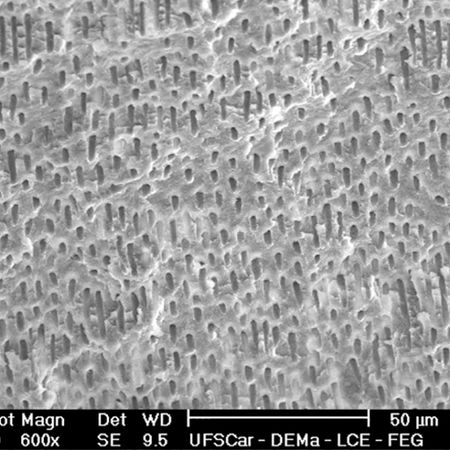
Objetivos: Avaliar a limpeza e a eficácia antimicrobiana do laser infravermelho com verde de indocianina (ICG) na eliminação do biofilme de E. faecalis no conduto radicular. Métodos: E. faecalis foi inoculado e incubado por 14 dias em 20 dentes humanos unirradiculados. Então, foi realizada coleta inicial (S1) e as raízes foram divididas aleatoriamente em dois grupos (n=10): G1) ICG + laser (810nm); G2) hipoclorito de sódio 2,5% (NaOCl). Os canais foram preparados com lima única X1 Blue...
Leia mais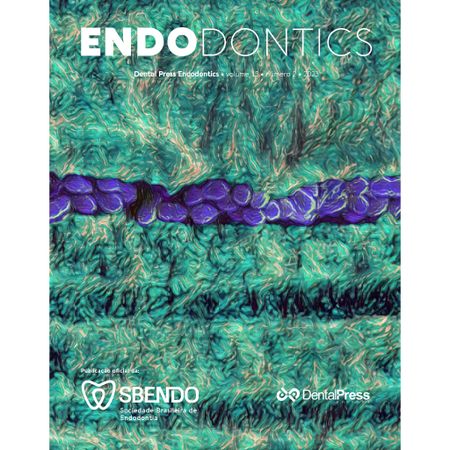
Introdução: A recessão gengival por vestibular é uma condição periodontal preocupante quando se manifesta em pacientes ortodônticos, nos quais diferentes fatores podem desempenhar um papel importante na sua etiologia. Objetivo: Determinar a prevalência de recessões gengivais por vestibular em incisivos inferiores e os fatores de risco em pacientes submetidos a tratamento ortodôntico. Material e Métodos: Estudo descritivo transversal; amostra aleatória de 110 pacientes, de ambos...
Leia mais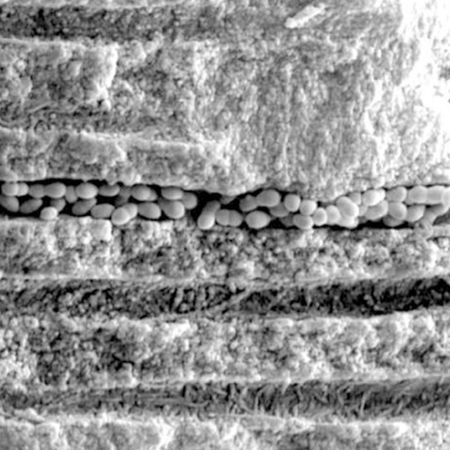
Objetivo: O objetivo do presente estudo foi avaliar a atividade residual e antimicrobiana do gel de clorexidina a 2% e do hidróxido de cálcio, isoladamente ou em combinação, como medicação intracanal. MÉTODOS: Cem pré-molares foram preparados e infectados por E. faecalis, e divididos em seis grupos: gel de clorexidina a 2% por 7 dias (CHX7); hidróxido de cálcio por 7 dias (CH7) e 14 dias (CH14); clorexidina a 2% combinada com hidróxido de cálcio por 7 dias (CHX + CH7); e dois...
Leia mais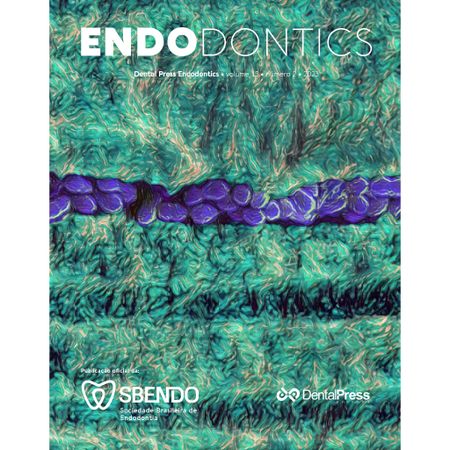
Introdução: Um atributo importante do comportamento dos instrumentos endodônticos é sua eficiência de corte. Objetivo: Avaliar a eficiência de corte de instrumentos rotatórios de NiTi com secções transversais semelhantes, usando uma nova metodologia. Métodos: Vinte dentes extraídos foram divididos em dois grupos e seus canais, preparados utilizando-se os sistemas BioRaCe BR0 (25/.08), BR1 (15/.05), BR2 (25/.04), BR3 (25/.06) e BR4 (35/.04) e BT-RaCe BT0 (10/.06), BT1 (35/.00) e...
Leia mais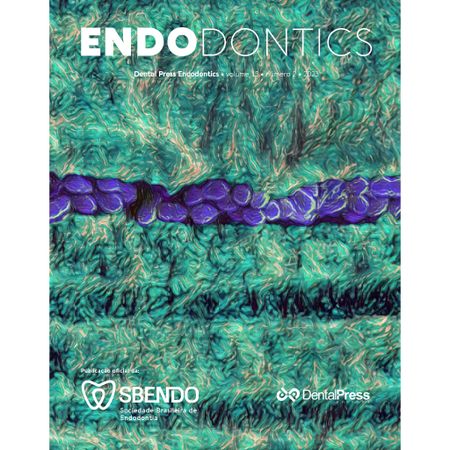
Introdução: A obliteração parcial ou total do canal radicular torna o tratamento endodôntico passível de falhas e acidentes. A técnica de Endodontia Guiada surgiu visando o sucesso nesse tratamento, quando necessário, com associação do escaneamento intrabucal e tomografia computadorizada de feixe cônico, evitando o desgaste desnecessário de estrutura dentária e diminuindo as chances de perfurações ou fratura de instrumentos. Objetivo: Verificar, por meio de uma revisão de...
Leia mais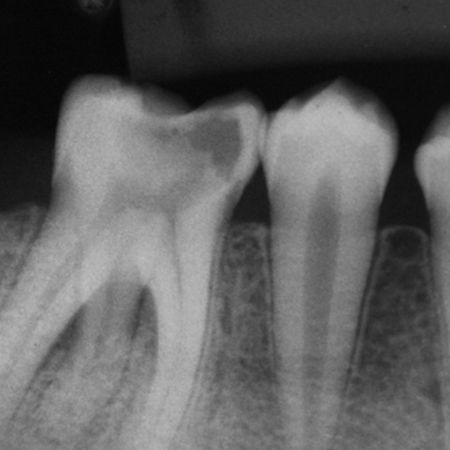
Introdução: Os primeiros molares inferiores permanentes geralmente apresentam duas raízes, uma situada mesialmente e outra distalmente; e dois, três ou quatro canais radiculares. Mas podem ocorrer variações no número de raízes e na morfologia dos canais radiculares. Não obstante, a ocorrência de três raízes separadas é extremamente incomum. Relato de caso: O presente relato clínico descreve o caso de um paciente com primeiros molares inferiores, em ambos os lados, com três...
Leia mais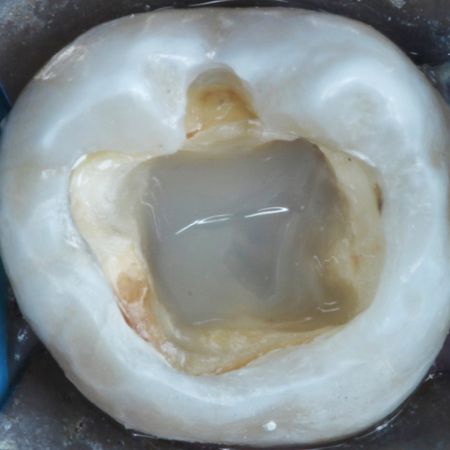
Introdução: A restauração de dentes tratados endodonticamente colabora para prevenir a contaminação do sistema de canais radiculares. A estratégia restauradora com as resinas bulk-fill e os sistemas adesivos simplificados de passo único (all-in-one) otimizam o restabelecimento estético e funcional do dente envolvido. Objetivos: Descrever, por meio de três casos clínicos, a restauração coronária com diferentes estratégias simplificadas utilizando as resinas bulk-fill com o seu...
Leia mais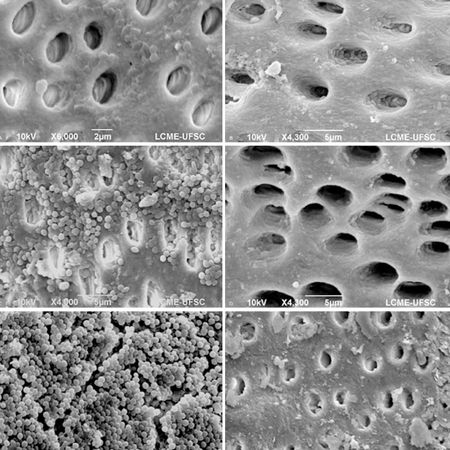
Objective: The aim of this ex vivo study was to evaluate and compare the immediate and residual antimicrobial effect of different intracanal medications against an E. faecalis biofilm in root canals of bovine teeth. Material and Methods: After the formation of a 7-day biofilm in 84 dentin tubes, the specimens were randomly divided into groups according to the intracanal medication used (n=14): G1) calcium hydroxide (CH) paste associated with Propylene Glycol (CH/PG); G2) Calen PMCC® paste;...
Leia mais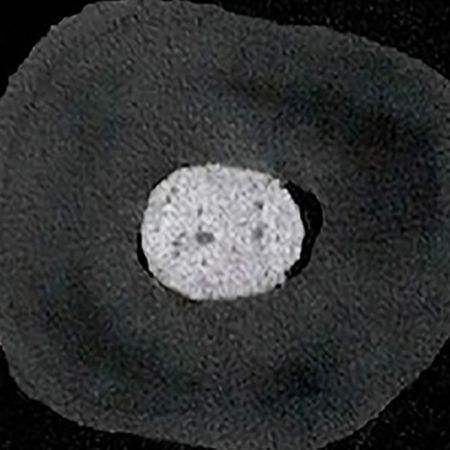
Objective: The aim of this study was to analyze the marginal adaptation and porosity of Mineral Trioxide Aggregate (MTA) and MTA Flow cements in the presence of blood through computed microtomography. Materials and methods: The roots of 48 bovine incisors measuring 10 mm were cleaned and filled with two groups of cements: MTA and MTA Flow. After filling the apical portion, the specimens were separated into two subgroups according to the storage medium (blood/ serum) and retained in a...
Leia mais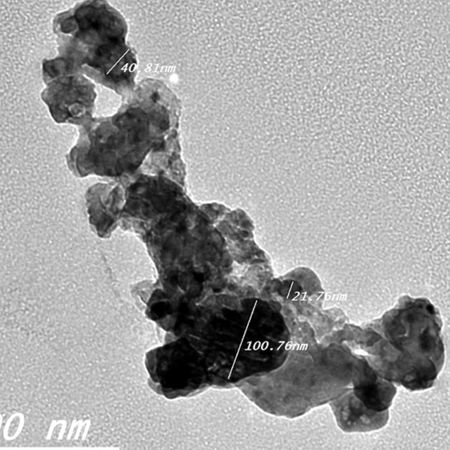
Objective: This study investigated and compared the solubility and the microshear bond strength of nano-formulation of ProRoot MTA (NPMTA) and Portland cement (NPC) with the commercially available ProRoot MTA (PMTA) and Portland cement (PC) in an attempt to develop a new root-end filling material. Methods: The solubility test was carried on 48 PVC ring molds filled with the tested cements: PMTA, PC, NPMTA and NPC. The molds were soaked in distilled water and were weighed at each experimental...
Leia mais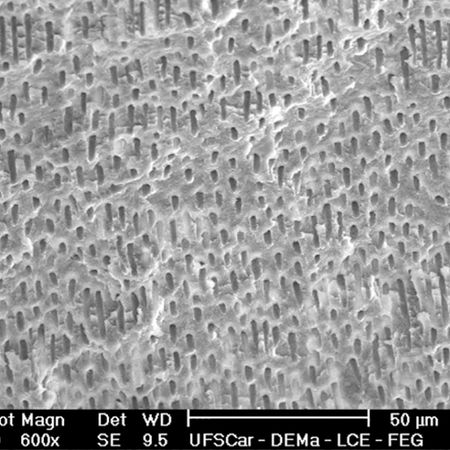
Objective: Evaluate the cleaning and antimicrobial effectiveness of infrared laser with indocyanine green (ICG) in the elimination of E. faecalis biofilm in the root canal. Material and method: E. faecalis was inoculated and incubated for 14 days into 20 single-rooted human teeth. Initial sample collection was performed (S1) and the roots were randomly divided into 2 groups (n = 10): G1) IGC + Laser Oblation (810 nm); G2) Sodium hypochlorite 2.5% (NaOCl). Instrumentation was performed using...
Leia mais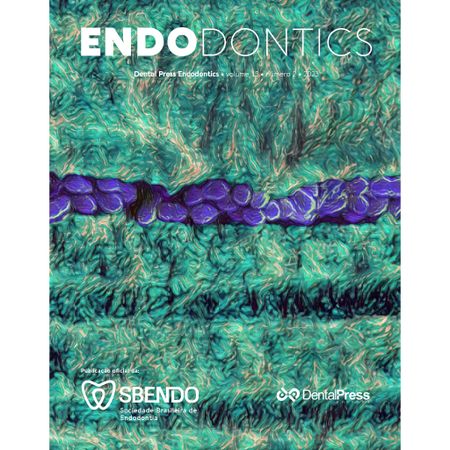
Introduction: The Gingival labial recession is a periodontal condition that is of concern for orthodontic patients when it manifests, in which several factors can play an important role in their etiology. Objective: To determine the prevalence of gingival labial recessions in the lower incisors and the risk factors in orthodontically treated patients. Materials and Methods: Cross-sectional descriptive study; random sample of 110 patients, of both sexes, ages between 18 and 45 years, who...
Leia mais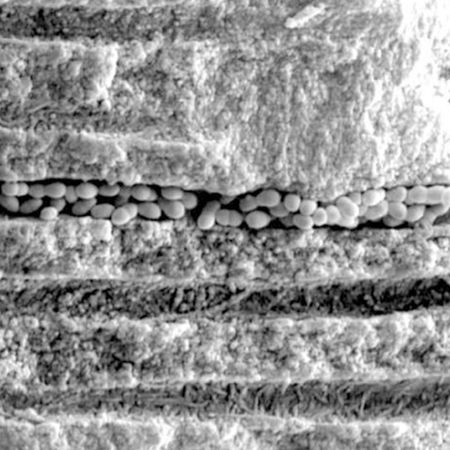
Objective: To evaluate residual and antimicrobial activity of 2% chlorhexidine gel and calcium hydroxide alone or in combination as intracanal dressings. Methods: One hundred premolars were prepared using the step-back technique and infected with E. faecalis. The specimens were divided into six groups: 2% chlorhexidine gel for 7 days (CHX7); calcium hydroxide for 7 and 14 days (CH7 and CH14, respectively); 2% chlorhexidine combined with calcium hydroxide for 7 days (CHX+CH7); and two control...
Leia mais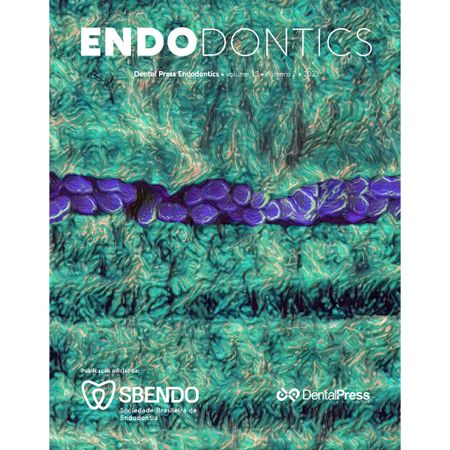
Introduction: An important attribute of endodontic instruments behaviour is cutting efficiency. Objective: Aimed was evaluating the cutting action of NiTi rotary instruments with similar cross-sectional designs, using a new methodology. Methods: Twenty extracted teeth were divided into two groups and the canals were prepared using (FKG, La Chauxde- Fonds, Switzerland) BioRaCe systems BR0 25/.08, BR1 15/.05, BR2 25/.04, BR3 25/.06 and BR4 35/.04 and BTRaCe BT0 10/.06, BT1 35/.00 and BT2...
Leia mais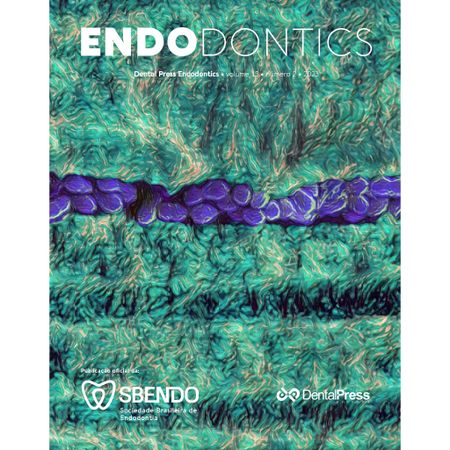
Introduction: The partial or total obliteration of the root canal makes endodontic treatment susceptible to failures and accidents. The technique of guided endodontics appeared with the aim of performing this treatment successfully, in association with intraoral scanning and cone beam computed tomography when necessary. Thereby avoiding unnecessary wear of the dental structure and reducing the chances of perforations and fractures of instruments. Objective: Conduct a literature review with...
Leia mais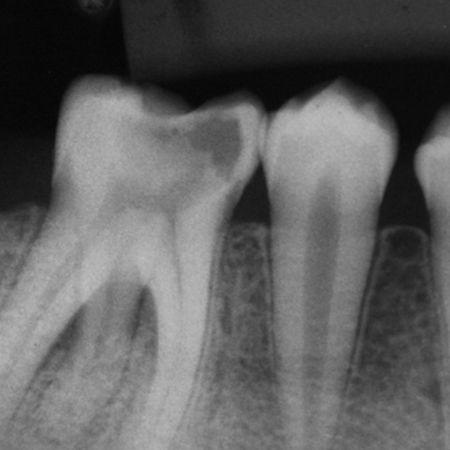
Introduction: Permanent mandibular first molars usually have two roots, usually with one situated mesially and one distally, and two, three or four root canals, but variations in the number of roots and in canal morphology may occur. However, the occurrence of three separate roots is extremely uncommon. Case report: This report describes the case of a patient with bilateral mandibular first molars with three roots and four root canals and that endodontic treatment was successfully performed on...
Leia mais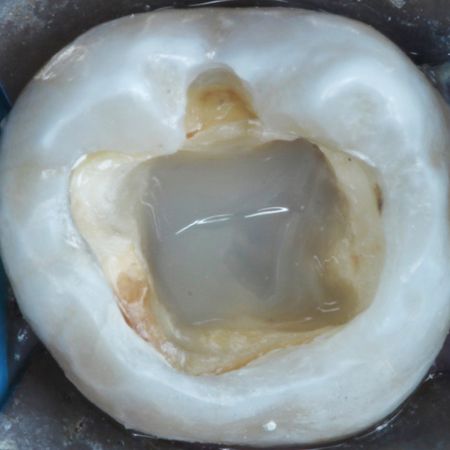
Introduction: Endodontically-treated coronal restoration teeth must be performed as soon as possible in order to avoid root canal system contamination. A new restorative strategy using bulk-fill resins and single self-etching adhesive (Universal) was introduced to optimize the clinical procedures in endodontically- treated teeth. Objective: To describe, through three clinical cases, the coronal sealing with different strategies using the bulk-fill resin with self-etching adhesive (universal)...
Leia maisCopyright © 1998 - 2022 DentalGO | Todos Direitos Reservados. DentalGO é uma marca Dental Press